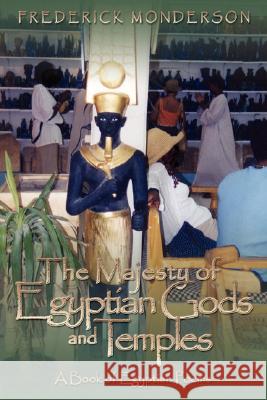The Majesty of Egyptian Gods and Temples: A Book of Egyptian Poems » książka
The Majesty of Egyptian Gods and Temples: A Book of Egyptian Poems
ISBN-13: 9781425974800 / Angielski / Miękka / 2007 / 216 str.
The Majesty of Egyptian Gods and Temples is a collection of poems to divinities, their homes and to selected monarchs expressing the thoughts of the ancients culled from research into the historical record. The 30 selections include: Ptah, Ra, Amon-Ra, Karnak, Luxor, Min, Osiris, Abydos Temple of Seti I, Seth, Mut, Anubis, Isis, Isis Temple of Philae, Hathor, Ramesseum, Medinet Habu, Temple of Dendera, Thoth, Horus the Falcon of Edfu, Edfu Temple of Horus, Senmut's Praise of Hatshepsut, Temple of Deir el Bahari, Imhotep, Nephthys, Ode to Queen Tiy, Cleopatra, The Temple of Esna, The Temple of Kom Ombo, You can do More Queen Aahmes-Nefertari, as well as a poem entitled Ode to Kwame Ture (Stokely Carmichael), a modern African American activist, nationalist and Pan-African spokesman, and with references. Utilizing the vernacular of the ancients, the poems extol the virtues, mannerisms, and influences of the gods and monarchs who left indelible impressions on the Egyptian religious, philosophical, ethical, cultural and historic landscape in the ancient Nile Valley experience. Regarding the temples, the poems are addressed to the building themselves praising their august natures while highlighting and describing the individual parts and their decorations that tell the story of the gods, kings and queens. Hence, while the poems describe the attributes and names of the gods, those to the queens describe their influences and accomplishments while the temple poems provide guidelines to help the visitor identify and appreciate the various features and messages they impart. The gods Ptah, Ra, Amon-Ra as well as Hatshepsut, Deir el Bahari, Karnak, Ramesseum and Medinet Habu receive more extensive praise because of the significant roles they played in religious expression, architectural development, military and imperial adventures, and influences of cultural expression, technological developments and economic pursuits. From the legacy set in motion by Aahmes-Nefertari that gave birth to the 18th Dynasty, the tenacity, daring and innovations of Hatshepsut, the influence and representational equality of Queen Tiy to the cards dealt Cleopatra, and so much more in-between, makes this work a welcome addition to any library dealing with the ancient Egyptians. All this notwithstanding, the author, a prolific writer, considers The Majesty of Egyptian Gods and Temples one of the best books he has written having transmitted much of the thoughts of the ancients in poetry and prose expression. In addition, photographs and plans help create visuals of the characters and reinforce the literary messages contained therein. This new genre of poetry combines religious beliefs and practice, philosophical and theological expressions, historical portraiture and recounting art and architectural descriptions that allow the reader to go beyond the ordinary to gain a deeper understanding of ancient Egyptian metaphysics, religion, art, theology and culture.











